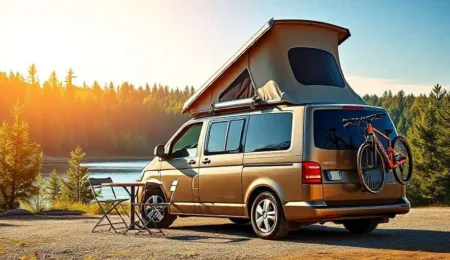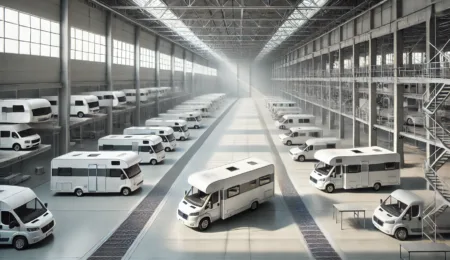Caravan´s Parking: Essential Guide and Tips
Finding suitable parking for a caravan is essential for owners. There are various options available, including open-air, covered, and enclosed parking, each with specific features and considerations.
Understanding the advantages, costs, and additional services associated with each type of parking is crucial. This article explores the different types of caravan parking and provides practical tips for ensuring vehicle care and maintenance.

Types of Caravan Parking
Understanding the various types of parking available for caravans is essential for maintaining their condition and securing them when not in use. Each type offers distinct features, advantages, and drawbacks.
Open-air Parking
Open-air parking represents the most straightforward and budget-friendly option. This type of parking is commonly found in rural areas or near camping grounds. While the simplicity of this option may be attractive, it comes with considerations that potential users must evaluate.
Advantages and Disadvantages
- Advantages:
- Low cost: Open-air parking is generally the most economical choice, making it appealing for those seeking to minimize expenses.
- Accessibility: Typically located in areas that are easy to reach, facilitating quick entry and exit.
- Disadvantages:
- Weather exposure: Caravans in open-air parking are vulnerable to harsh weather conditions, including rain, snow, and sun. This exposure can lead to potential damage over time.
- Limited security: Often lacking security measures, these locations may be at greater risk for theft or vandalism.
Recommended Settings
This type of parking is most suitable for individuals residing in climates with milder weather. Regular inspections and maintenance are crucial to mitigate potential damages caused by external factors.
Covered Parking
Covered parking provides an intermediate solution, allowing caravans to be parked under a roof while often still being on a gravel or dirt surface. This arrangement offers more protection than open-air options but comes with its own set of considerations.
Benefits and Limitations
- Benefits:
- Weather protection: The roof shields the vehicle from direct impacts of rain and snow, helping maintain its exterior and structural integrity.
- Moderate cost: Although typically more expensive than open-air parking, it remains more affordable than fully enclosed options.
- Limitations:
- Potential humidity: Depending on the ventilation, condensation can occur, leading to moisture problems inside the caravan.
- Ongoing maintenance: Although covered, regular checks are still necessary to prevent potential weather-related issues.
Ideal Conditions for Use
Covered parking is ideal for those in regions with unpredictably harsh weather or for caravan owners who aim to use their vehicle intermittently without frequent checks. This option balances protection and affordability.
Enclosed Parking
Enclosed parking facilities provide the highest level of security and protection for caravans. These spaces are typically located within industrial warehouses or specially designed storage units.
Security Features
- Comprehensive protection: The caravan is safeguarded against all weather conditions, ensuring that it remains in optimal condition.
- Enhanced security measures: Most enclosed facilities come equipped with robust security systems, including surveillance cameras and restricted access, significantly reducing the risk of theft.
Best Uses and Considerations
This parking type is particularly suitable for those embarking on extended trips or for owners who wish to store their caravans for long periods without worry. Although the costs can be significantly higher than other options, the peace of mind and strong protection provided can justify the expense for many owners.
Pricing and Tariffs
Understanding pricing structures and tariffs for caravan parking is essential for ensuring budget compliance and optimal vehicle safety. Costs can fluctuate based on various factors including location, type of parking, and service offerings.
Factors Affecting Prices
Several elements can influence the pricing of caravan parking. These include:
- Type of Parking: Different parking options, such as open-air, covered, and enclosed, come with varying cost implications. Open-air parking is typically the most affordable, while enclosed facilities offer premium services at a higher price.
- Location: Prices are also substantially affected by geographic location. Urban areas or regions with high tourism demand may have steeper prices compared to rural settings, where competition among providers can lead to more affordable rates.
- Duration of Stay: Short-term versus long-term parking arrangements can result in different pricing structures. Operators may offer discounted monthly rates for extended use, while daily rates can add up quickly for shorter stays.
- Additional Services: Amenities such as security, maintenance checks, or pre-pickup preparations can contribute to the overall price. The inclusion of these services might justify a higher tariff for many users.
Regional Price Variations
Prices for caravan parking can markedly differ from one region to another due to several factors:
- Cost of Living Index: Areas with a higher cost of living generally reflect this in the parking fees charged. Conversely, more affordable regions may offer lower rates.
- Tourist Demand: Popular tourist destinations often see increased demand for caravan parking, leading to elevated prices during peak seasons. In contrast, off-peak periods might yield more attractive rates.
- Competitiveness of Local Market: Regions with multiple parking facilities can benefit consumers due to competitive pricing. Areas with fewer options may see inflated prices due to a lack of alternatives.
Comparing Parking Options by Cost
When evaluating various parking options, cost comparison is vital. Here are some key considerations:
- Base Tariffs: Look for the baseline costs associated with each type of parking solution. Open-air options may start from as low as €18.30 per month, while enclosed parking facilities can be significantly more expensive.
- Hidden Fees: It is essential to identify if there are any additional charges beyond the advertised prices. Fees for access, security deposits, or maintenance services can impact the overall costs considerably.
- Package Deals: Some facilities may offer bundled services that combine parking with other value-added options such as cleaning or maintenance, potentially providing better overall savings.
Security and Insurance Options
Ensuring the safety and protection of a caravan while in parking facilities is paramount. Security and insurance options are vital considerations that provide peace of mind to owners. These elements not only safeguard the vehicle from theft and damage but also offer essential liability coverage.
Surveillance and Safety Measures
Most parking facilities implement various surveillance and safety measures to protect caravans. These can include:
- CCTV monitoring to deter criminal activities.
- Secure access controls, such as gated entry and exit points.
- On-site security personnel who regularly patrol the area.
- Good lighting throughout the parking area to enhance visibility during the night.
- Emergency contact systems for quick assistance.
By concentrating on robust surveillance strategies, owners can be confident that their caravans are less likely to be targeted for theft or vandalism. A well-monitored facility often reflects a commitment to maintaining safety standards, increasing owner trust in the services provided.
Importance of Civil Liability Insurance
Civil liability insurance is a crucial aspect when considering insurance for a caravan. This type of coverage protects against damages that may occur as a result of an accident. Key points about civil liability insurance include:
- It covers damages to third-party vehicles or property.
- It safeguards the owner from legal claims made due to accidents.
- Many parking facilities require proof of civil liability insurance before allowing a caravan to be parked.
Having adequate civil liability coverage is not just a legal requirement but also an essential layer of protection that can mitigate financial risks in case of unforeseen incidents.
Theft and Damage Protections
Theft and damage protections are fundamental components of any insurance policy regarding caravan parking. Owners should consider the following aspects:
- Coverage against theft of the caravan itself as well as its contents.
- Protection against damage caused by weather events, vandalism, or accidents.
- Options for additional coverage can be available to suit specific needs and concerns.
Choosing a facility that provides comprehensive insurance options increases the chances of recovering losses in unfortunate circumstances. Owners are encouraged to carefully assess their insurance policy to ensure it aligns with their specific requirements and adequately covers the value of their caravan.
Additional Services
When selecting a parking facility for a caravan, the range of additional services available can greatly impact both the convenience and security of the vehicle during its stay. These services enhance the overall experience and ensure that the caravan remains in optimal condition.
Pre-pickup Vehicle Preparation
Preparing a caravan for collection is essential to ensure that it is ready for immediate use. Facilities often offer pre-pickup services that help owners avoid delays when retrieving their vehicles.
Regular Maintenance and Repairs
Maintenance is crucial for the longevity of any vehicle. Regular checks and repairs can prevent minor issues from escalating, ensuring that the caravan is in top condition upon return to its owner.
Tyre and Battery Checks
Regular inspections of tyres and batteries are vital. Proper tyre pressure and tread depth enhance safety on the road. Meanwhile, checking the battery ensures that it maintains adequate charge, reducing the risk of breakdowns. These services may include:
- Pressure checks to ensure optimal performance.
- Visual inspections for signs of wear.
- Battery testing for voltage levels.
Cleaning and Water Systems
Keeping the caravan clean is not just about aesthetics; it also prevents long-term damage. Regular cleaning services ensure that the exterior and interior are well-maintained. Additionally, maintaining water systems is essential for hygiene and functionality.
- Exterior wash services to remove dirt and grime.
- Interior cleaning, including upholstery and surfaces.
- Inspection and flushing of water systems to prevent blockages and contamination.
Optional Extras and Accessories
Many facilities provide optional services that add value and convenience. These extras can range from basic maintenance to more specialized care based on individual needs.
- Installation of additional security devices to enhance theft protection.
- Provision of storage solutions for outdoor equipment such as awnings and chairs.
- Access to caravan accessories and tools for minor repairs or enhancements.
Choosing the Right Parking Space
Finding the most suitable parking space is crucial for ensuring the long-term care and protection of a caravan. Various factors need to be evaluated, including contract terms and the condition of the facilities.
Contractual Terms and Conditions
Understanding the contractual terms is essential before committing to a parking space. This includes reviewing the duration of the agreement, payment terms, and cancellation policies. It’s important to ensure that the conditions meet personal requirements and provide flexibility if circumstances change.
The contract should outline responsibilities, such as maintenance duties or potential fees for damages. Clarity in these terms can prevent misunderstandings between the caravan owner and the parking facility. Reading through all provisions carefully will help ensure that no important aspects are overlooked.
Assessing Parking Facilities
When evaluating different parking facilities, several criteria need to be considered to ensure that they meet specific needs. These criteria include accessibility, location, and standards of upkeep.
Accessibility and Location
The location of the parking facility is a critical factor. Proximity to main roads and easy access for entering and exiting the area can make a significant difference in convenience. Considering whether the space is near home, work, or travel routes can save time and add comfort.
Accessibility also refers to the physical layout of the parking space. Wide aisles and user-friendly designs are preferable, allowing for easy maneuverability when parking and retrieving the vehicle. Facilities that cater to a variety of vehicle sizes will enhance usability.
Facility Upkeep and Standards
Inspecting the overall maintenance of the parking facilities is crucial. A well-kept area typically indicates a commitment to quality service. This includes cleanliness, security features, and general organization of the parking space. Facilities that are well maintained not only provide a better environment for storage but also reflect a professional management approach.
Reviewing the security measures in place is also essential. Factors such as lighting, surveillance, and overall safety protocols can significantly influence the decision. A facility with higher security standards offers peace of mind and greater protection for the vehicle.
Practical Tips for Caravan Care
Proper care for a caravan ensures its longevity and performance. Regular attention to maintenance and protection from environmental factors is essential. Following these practical tips will aid in preserving the vehicle’s condition.
Moisture and Weather Protection
Moisture can be detrimental to caravans, leading to mold growth and damage to interior components. Therefore, effective moisture control and weatherproofing are vital in maintaining a caravan’s integrity.
Use of Dehumidifiers
Utilizing dehumidifiers inside the caravan can significantly reduce humidity levels. This is particularly important during damp seasons or in humid climates. A good quality dehumidifier will extract excess moisture from the air, helping to prevent mold and mildew formation. Ensuring that the caravan is adequately ventilated, while using a dehumidifier, further enhances moisture control. Placing it in strategic areas, especially near water sources, can yield better results.
Routine Inspections and Maintenance
Conducting regular inspections of the caravan helps identify potential issues before they escalate into serious problems. Various aspects require periodic checks to ensure everything functions as intended. Establishing a routine will help keep the vehicle in optimal condition.
- Exterior Checks: Inspect the bodywork for any signs of damage or wear. Regularly clean and wax the exterior to protect the paint from the elements.
- Interior Assessments: Examine the interior for dampness, especially in corners and around windows. Ensure that all appliances are functioning correctly.
- Systems Review: Regularly check the plumbing and electrical systems to ensure they operate safely and efficiently. Look for leaks or frayed wires, which need immediate attention.
Preparing Your Caravan for Storage
When storing a caravan for an extended period, taking proper precautions is crucial. Preparation not only protects the vehicle but also ensures it remains ready for the next adventure.
- Cleaning the Caravan: Thoroughly clean the interior and exterior. Remove any food items to prevent pests and ensure all surfaces are dry, minimizing the risk of mold.
- Emptying the Tanks: Drain all water tanks and ensure that no residual water remains that could freeze or stagnate. This is especially vital in colder months to prevent freezing in pipes.
- Using Covers: Consider using breathable covers to protect the caravan from dust and debris while allowing air circulation.
- Enabling Battery Maintenance: Disconnect the battery and store it in a cool, dry place. This helps prolong its lifespan, ensuring it doesn’t discharge while in storage.





Leave a Reply